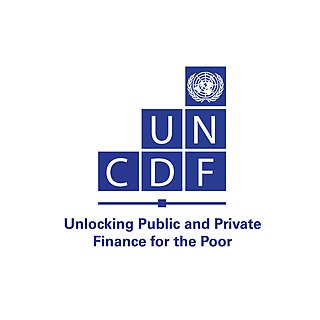
Risk management is the identification, evaluation, and prioritization of risks followed by coordinated and economical application of resources to minimize, monitor, and control the probability or impact of unfortunate events or to maximize the realization of opportunities.

The Inter-American Development Bank is an international financial institution headquartered in Washington, D.C., United States of America, and serving as the largest source of development financing for Latin America and the Caribbean. Established in 1959, the IDB supports Latin American and Caribbean economic development, social development and regional integration by lending to governments and government agencies, including State corporations.
The United States Navy Working Capital Fund (NWCF) is a branch of the family of United States Department of Defense (DoD) Working Capital Funds. The NWCF is a revolving fund, an account or fund that relies on sales revenue rather than direct Congressional appropriations to finance its operations. It is intended to generate adequate revenue to cover the full costs of its operations, and to finance the fund's continuing operations without fiscal year limitation. A revolving fund is intended to operate on a break-even basis over time; that is, it neither makes a profit nor incurs a loss.

The United Nations Capital Development Fund (UNCDF) makes public and private finance work for the poor in the world's 46 least developed countries (LDCs).
Gatton College of Business and Economics is a college of the University of Kentucky. Gatton College educates more than 4,000 undergraduate, master's, and doctoral students in accounting, economics, finance, management, and marketing and supply chain management. Founded in 1925 as the College of Commerce, the college was created from the Department of Economics and was given full accreditation by the Association to Advance Collegiate Schools of Business International. Initially the college occupied a single room in White Hall. In 1995, the Board of Trustees renamed the college in honor of Mr. Carol Martin "Bill" Gatton, '54, in recognition of his $14 million pledge. The donation was the largest in the history of the university. The current dean is Simon J. Sheather. The college is located in central campus along South Limestone.
The following outline is provided as an overview of and topical guide to business management:

The National Capital Planning Commission (NCPC) is a U.S. government executive branch agency that provides planning guidance for Washington, D.C., and the surrounding National Capital Region. Through its planning policies and review of development proposals, the Commission seeks to protect and enhance the resources of the U.S. national capital.

Jawaharlal Nehru National Urban Renewal Mission (JNNURM) was a massive city-modernization scheme launched by the Government of India under the Ministry of Urban Development. It envisaged a total investment of over $20 billion over seven years. It is named after Pt. Jawaharlal Nehru, the first Prime Minister of India. The aim is to encourage reforms and fast track planned development of identified cities. Focus is to be on efficiency in urban infrastructure and service delivery mechanisms, community participation, and accountability of ULBs/ Parastatal agencies towards citizens.
The Bay Area Toll Authority (BATA) is a state agency created by the California State Legislature in 1997 to administer the auto tolls on the San Francisco Bay Area's seven state-owned toll bridges. On January 1, 1998, the Metropolitan Transportation Commission (MTC) — the transportation planning, financing and coordinating agency for the nine-county region — began operations as BATA. In August 2005, the California Legislature expanded BATA's responsibilities to include administration of all toll revenue and joint oversight of the toll bridge construction program with Caltrans and the California Transportation Commission.
Retirement planning, in a financial context, refers to the allocation of savings or revenue for retirement. The goal of retirement planning is to achieve financial independence.

Kerala, a state in Southern India, has a network of 11 National Highways, 72 State Highways and many district roads.

The Clean Water State Revolving Fund (CWSRF) is a self-perpetuating loan assistance authority for water quality improvement projects in the United States. The fund is administered by the Environmental Protection Agency and state agencies. The CWSRF, which replaced the Clean Water Act Construction Grants program, provides loans for the construction of municipal wastewater facilities and implementation of nonpoint source pollution control and estuary protection projects. Congress established the fund in the Water Quality Act of 1987. Since inception, cumulative assistance has surpassed 153.6 billion dollars as of 2021, and is continuing to grow through interest earnings, principal repayments, and leveraging.
Energy Savings Performance Contracts (ESPCs), also known as Energy Performance Contracts, are an alternative financing mechanism authorized by the United States Congress designed to accelerate investment in cost effective energy conservation measures in existing Federal buildings. ESPCs allow Federal agencies to accomplish energy savings projects without up-front capital costs and without special Congressional appropriations. The Energy Policy Act of 1992 authorized Federal agencies to use private sector financing to implement energy conservation methods and energy efficiency technologies.

The Arab Bank for Economic Development in Africa (BADEA) is a development bank owned by Arab League to provide development financing to African countries.

Rajdhani Unnayan Kartripakkha is a Bangladeshi public agency responsible for coordinating urban development in Dhaka. RAJUK is composed of various public officials, city planners, urban administrators, engineers, and architects. It is the National Authoritative Board on building planning, estates and resources, plot allotment, and construction approvals from both public and private entities. It utilizes the Dhaka Improvement Trust Rule of 1969 and The Town Improvement Act of 1953, both scribed since before the Independence of Bangladesh.

REC Limited, formerly Rural Electrification Corporation Limited, of which Power Finance Corporation Limited (PFC) is the holding company of that is under the ownership of the Ministry of Power, the Government of India. It finances and promotes power projects across India. The PSU provides loans to Central/State Sector Power Utilities in the country, State Electricity Boards, Rural Electric Cooperatives, NGOs and Private Power Developers. On 20 March 2019, PFC signed an agreement to acquire a 52.63% controlling stake in REC for ₹14,500 crore (US$1.8 billion). On 28 March, PFC announced that it had completed making the payment for the acquisition and intended to merge REC with itself in 2020. However, REC has maintained that merging PFC-REC is no longer an option.
Measure R was a ballot measure during the November 2008 elections in Los Angeles County, California, that proposed a half-cent sales taxes increase on each dollar of taxable sales for thirty years in order to pay for transportation projects and improvements. The measure was approved by voters with 67.22% of the vote, just over the two-thirds majority required by the state of California to raise local taxes. The project was touted as a way to "improve the environment by getting more Angelenos out of their cars and into the region's growing subway, light rail, and bus services." It will result in the construction or expansion of a dozen rail lines in the county.
PACE financing is a means used in the United States of America of financing energy efficiency upgrades, disaster resiliency improvements, water conservation measures, or renewable energy installations in existing or new construction of residential, commercial, and industrial property owners. Depending on state legislation, PACE financing can be used to finance water efficiency products, seismic retrofits, resiliency, and other measures with social benefits.

Corporate finance is the area of finance that deals with the sources of funding, and the capital structure of corporations, the actions that managers take to increase the value of the firm to the shareholders, and the tools and analysis used to allocate financial resources. The primary goal of corporate finance is to maximize or increase shareholder value.
The Kampala–Jinja Expressway, also known as the Jinja–Kampala Expressway, is a proposed four-lane toll highway in Uganda, linking Kampala, the capital and largest city of Uganda, with the city of Jinja in the Eastern Region of Uganda.










